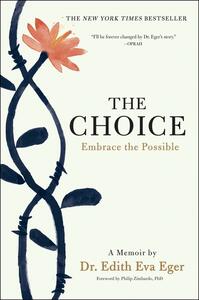Take a photo of a barcode or cover
Inspiring and very moving book. The first part is about her captivity in Hitler's camps and what she had to endure. But even at this stage, she notices that she and her sister have a different way of perceiving the world. And that is basically what it all comes down to in this book. But more on that later. The hardships during the time after liberation are not as often put to paper as the concentration camp experiences. This book gives an insight in what that looked like in every day live for survivors.
But the real gem in this book is the way Dr. Eger connects her story with the learnings of positive psychology and self-compassion. And that healing is a path with obstacles. With examples from her patients' stories, it makes it easier to understand what it means. She mention there is no one-size-fits-all way to healing, but of course there are some things that everyone can work on. I was moved deeply by what she wrote and inspired me to continue on my own inner journey.
But the real gem in this book is the way Dr. Eger connects her story with the learnings of positive psychology and self-compassion. And that healing is a path with obstacles. With examples from her patients' stories, it makes it easier to understand what it means. She mention there is no one-size-fits-all way to healing, but of course there are some things that everyone can work on. I was moved deeply by what she wrote and inspired me to continue on my own inner journey.
hopeful
informative
reflective
sad
challenging
dark
emotional
hopeful
informative
inspiring
sad
tense
fast-paced
Amazing. Simply amazing. Please read it. You will not regret it. You might cry. I did, a lot. But it was worth it.
Four stars.
I really wanted to give this the five stars, the same as i did with The Twins of Auschwitz and other similar books i have read in the past.
Three thirds of the book is amazing, just what you would expect. Powerful, passionate, full of hope and a journey that grabs you, to take you into the electrified fenced hell and back out again.
But the finals parts are just in-depth summaries of the clients that Edith worked with and helped in her time as a Psychiatrist. I was hoping to just read one maybe two of these cases, but they went on for to long regardless, and having to read another case and again lost my interest in them. While reading these pages i was simply hoping there wouldn't be another one to work through. I wanted to read about Edith's journey start to finish which is what i was so eager to do .
I'm ashamed to say i skipped the last two cases she wrote about as i just wanted to get to her own personal summary of her life.
I really wanted to give this the five stars, the same as i did with The Twins of Auschwitz and other similar books i have read in the past.
Three thirds of the book is amazing, just what you would expect. Powerful, passionate, full of hope and a journey that grabs you, to take you into the electrified fenced hell and back out again.
But the finals parts are just in-depth summaries of the clients that Edith worked with and helped in her time as a Psychiatrist. I was hoping to just read one maybe two of these cases, but they went on for to long regardless, and having to read another case and again lost my interest in them. While reading these pages i was simply hoping there wouldn't be another one to work through. I wanted to read about Edith's journey start to finish which is what i was so eager to do .
I'm ashamed to say i skipped the last two cases she wrote about as i just wanted to get to her own personal summary of her life.
Para mí éste libro es una obra maestra; se convirtió en uno de mis favoritos.
Як би то не звучало гучно, але я прочитала одну з найкращих і найінтимніших книг у свому житті.
Книга, яка містить в собі стільки відповідей, стільки відвертості, стільки пояснень.
Вона зовсім не про Аушвіц, а правильніше не лише про нього. Вона про той великий концентраційний табір який ми носимо в собі - наш власний мозок і ті "вірування" про себе, що ми туди вкладаємо
Книга, яка містить в собі стільки відповідей, стільки відвертості, стільки пояснень.
Вона зовсім не про Аушвіц, а правильніше не лише про нього. Вона про той великий концентраційний табір який ми носимо в собі - наш власний мозок і ті "вірування" про себе, що ми туди вкладаємо


